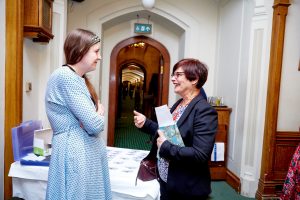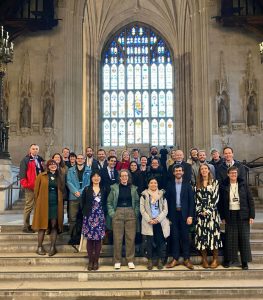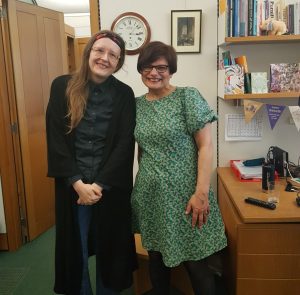Maria Sobczyk shares her experience of being part of the Royal Society pairing scheme, which links scientists with people at the heart of UK policy making
“Yes, Minister” – truth, fiction, or something in between? I have always been fascinated by the inner workings of politics. So, when an opportunity arose to combine this interest with my role as a post-doc in health data science, I promptly applied for the 2023 edition of the Royal Society pairing scheme, which offers a week-long experience in Westminster.

The scheme has been running annually for 20+ years and every year invites around 30 researchers at a post-doctoral level (and above) from across the UK and a variety of STEM disciplines. The programme consists of a three- (or four-) day blend of workshops, talks, and events designed to foster dialogue between researchers and policymakers, punctuated by time spent shadowing a local MP, member of the House of Lords, or a senior civil servant.
I was thrilled to be paired with Bristol West MP, Thangam Debbonaire, and her office team.
My week in Westminster – research and policy

Having arrived to London on Sunday evening for an early morning start on Monday, it was lovely to be able to meet all the participants and organizing team for a dinner at a charming pub in Covent Garden.
On Monday, we convened at the Royal Society’s headquarters overlooking St James’s Park. During a quick tour of the library, we were shown the collection’s highlights: Royal Society’s original Charter Book containig signatures of all the fellows (among recent additions: Elon Musk), Newton’s death mask and the first edition of Darwin’s “On the Origin of Species”. Afterwards, we settled into the elegant Wolfson Rooms for a day of talks on policy and science, science in the media and the workings of Parliament and Government. Speakers included political researcher and former political adviser Prof Andrew Blick and former university and science minister Lord David Willets.
In the evening, we met up again, this time at the Palace of Westminster for an informal reception featuring an exhibition of science policy-driven organizations aligned with the Royal Society which introduced us to their work and ethos. It was also a chance to get to know the MPs, Peers and civil servants we were paired with, and if lucky, later move onto the Strangers’ Bar next door.
Tuesday afternoon was spent at the QEII Centre listening to a roster of talks from members of the Government Science and Engineering Profession. The presentations introduced us to a diverse section of the civil service who are trying to include evidence (including scientific) into policy proposals.
Lastly, on Wednesday afternoon we were offered a taste of mock select committee hearing. It involved four MPs with interest in science – Stephen Metcalfe, Katherine Fletcher, Rebecca Long-Bailey and Carol Monaghan. They debated our questions around how they would design UK science ecosystem, which also provided us with a platform to directly address issues of current interest among the gathered scientists.
My week in Westminster – MP shadowing

On Tuesday morning, I was cheerily whisked off from the entrance to the Porticullis House by Elodie, Thangam’s PA, who showed me around the building and introduced me to Peter, Thangam’s special adviser. Together, we reviewed the daily Order Paper which dictates the goings-on in the House of Commons on any given day. We then briefly popped into a reception hosted by Great Western Railway to find out how timetable changes will likely affect Thangam’s Bristol constituents. We then had to race across the underground passage (there is also a direct exit to the tube!) to get to a Palace of Westminster room for a strategic meeting where Thangam and her team discussed their plans for the upcoming weeks.
On the next day, we were given a bit of historical background on a tour of the Palace of Westminster, including its various peculiarities. In the House of Lords, for example, we caught a glimpse of the Woolsack, a small sofa that serves as the seat for the Lord Speaker, which is filled with wool from all UK nations. Following a quick ceremonial procession, some of us then climbed upstairs to the gallery to sit in on the Prime Ministers’ Questions, a weekly ritual of parliamentary ping-pong where policy meets pantomime.
Having escaped the political theatre, I then grabbed a long lunch with Thangam over which we friendly sparred on Brexit, drug policy and discussed the main concerns of the Bristol West constituency. Back to business afterwards, it was time for Thagnam to call the Bristol office for some managerial steer. As I was escorted back to the Westminster Hall by the ever-dynamic Bristol West MP, I reflected that I was only scratching the surface of the busy Westminster machinery. It was certainly an interesting world, full of clashing demands, and careful networking, quite unlike more predictable days and independent way of working at the university.
Why it matters that scientists engage with policy
Throughout the week, I came to appreciate the crucial role scientists can play in engaging with policy. It became increasingly evident that policymakers require expert advice to help them navigate the complex world of science. As researchers, we possess not only an opportunity but also an obligation to contribute our knowledge, ensuring that policy decisions are firmly rooted in evidence and scientific understanding.
As the journey continues, I am now looking forward to welcoming Thangam at MRC Integrative Epidemiology Unit’s Oakfield House in Bristol for a return visit for her to learn about the research and challenges faced by our group of (mostly genetic) epidemiologists.
